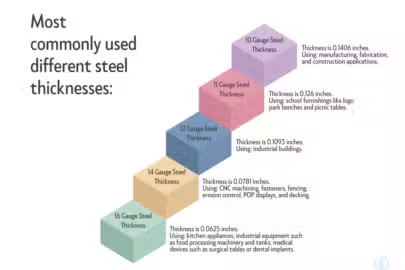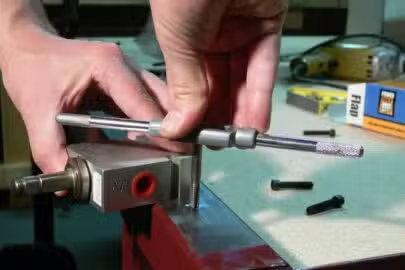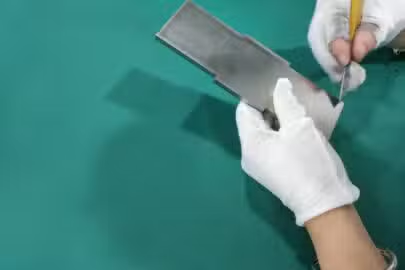Titanium is an exceptional material used in CNC machining. It is a strong, light, and durable material frequently utilized across industries like aerospace, and medical. Its uniqueness also attracts manufacturers in the automotive industry to use it during production.
Titanium metal has a reduced friction coefficient, making it perfect for highly stressed applications. However, due to the hardness of titanium, it is challenging to use regular machining methods to form this metal. This is where the relevance of CNC machining titanium comes in, an accuracy process where the titanium can be cut into complex shapes and dimensions. Titanium CNC machining is an exact process requiring extreme care to guarantee accuracy.
CNC machining titanium parts are extraordinarily durable but can be difficult due to their excessive tensile strength. But in this article, you will learn why CNC machining titanium is a unique and most utilized method, its challenges, and its application. You will also learn best practices for CNC Machining titanium to get you started.
Properties of Titanium

Titanium is a unique material that can be used in many different ways. It’s super strong, very light, and doesn’t easily rust. These unique qualities of titanium and its mixtures make them great for creating rapid prototyping. Titanium properties include:
Higher Strength-to-Weight Ratio
One of titanium’s most notable attributes is its exceptionally lightweight nature. Titanium has the most elevated strength-to-weight ratio of any element. Its density, which is 4.5g/cm3, is relatively lower than steel, which is 7.8g/cm3, and the strength of titanium is 288kNm/kg. These properties describe why titanium is the reason for the jet engines’ drive-to-weight ratio improvement. In the aerospace industry, this property translates to reduced fuel consumption and improved overall aircraft performance. Lightweight materials are of paramount importance when designing and manufacturing aerospace titanium parts.
Corrosion Resistance
Titanium’s resistance to corrosion is another standout characteristic. It can withstand exposure to hydrochloric acids, dilute sulfuric and chloride solutions, and most natural acids without rusting or deteriorating. This exceptional corrosion resistance is invaluable in medical titanium applications, where the metal is often employed in implants and surgical instruments that come into contact with bodily fluids. Maintaining its integrity and hygiene is a critical factor for these applications.
Biocompatibility
Biocompatibility is a crucial property that sets titanium apart in medical applications. It doesn’t provoke adverse reactions within the human body, making it an ideal choice for implants and prosthetic devices. This biocompatibility ensures that the body readily accepts titanium without causing harmful side effects, a prerequisite for any material used in medical procedures.
Thermal Properties
Despite its numerous advantages, titanium does present specific machining challenges. Titanium has a low thermal conductivity at 21.9 W/(m-K), which can result in heat buildup during the machining process. This heat can, in turn, compromise the quality of the finished product. Furthermore, titanium is notorious for its reactivity with cutting tools, accelerating titanium tool wear and requiring frequent changes.
Mechanical and Electrical Properties
Titanium is quite ductile and has a tensile strength; its lowest yield of strength is around 240-241 MPa in pure grade 1. Its hardness is between 70-74, and its splitting toughness of 66 MPa-m1/2. Titanium pure grade 11 Young’s modulus of elasticity is 116 GPA and a shear modulus of 44 GPA.
Titanium is known for its lower electrical conductivity, which is 3.1% IACS. This is a downside that makes it unusable for electrical conductivity. However, the combination of its mechanical and physical properties compensates for such a downside.
Element Properties
| PROPERTIES | VALUE |
|---|---|
| Atomic number | 22 |
| Group | 4 |
| Melting Point | 1941 K (1668 °C, 3034 °F) |
| Boiling Point | 3560 K (3287 °C, 5949 °F) |
| Atomic Weight | 47.867 |
| Density | 4.506g/cm3 |
| Thermal conductivity | 21.9 W/(m-K) |
| Heat of fusion | 14.15 kJ/mol |
| Heat of vaporization | 425 kJ/mol |
| Solidus/liquidus | 1725 °C (3135 °F) |
Benefits of CNC Machining Titanium
CNC machining titanium is an advanced manufacturing process that offers numerous advantages, mainly due to the unique properties of titanium as a metal and the precision of CNC technology. Its benefits include:
High Precision
CNC machining titanium is known for its ability to achieve a high level of precision and accuracy. This is why it is used in the aerospace, medical, and other high-precision industries that demand parts with tight tolerances. CNC machines excel in this aspect, ensuring that even complex and intricate components are accurately manufactured. CNC machining can consistently meet stringent specifications, whether creating intricate medical implants or aerospace components.
Material Efficiency
Efficiency in material usage is a significant benefit of CNC machining titanium. Titanium is an expensive material, and minimizing waste is crucial for cost-effectiveness. CNC machines are designed to efficiently remove material, ensuring that expensive titanium is used optimally. The reduction in material waste not only saves costs but also contributes to sustainability by minimizing environmental impact.
Complex Geometries
CNC machining is versatile and capable of producing complex and intricate part geometries, which can be challenging to achieve with traditional manufacturing methods. This adaptability is particularly valuable in industries where custom or intricately designed components are essential. CNC titanium parts allow manufacturers to bring highly intricate and complex designs to life, opening up possibilities for innovative products and solutions in aerospace, medical devices, and more.
Repeatability
Consistency is a hallmark of CNC titanium machining services. CNC machines can produce large quantities of parts with uniform quality. This is particularly valuable in industries like aerospace and automotive, where component quality, reliability, and uniformity are paramount. Whether you need one component or thousands, CNC machining ensures that each part meets the same high-quality standards, reducing the chances of defects and ensuring product reliability.
Surface Finish
CNC machining can achieve excellent surface finishes on titanium components. This is a critical feature, especially in applications where the appearance and smoothness of the final product matter. In the medical and aerospace sectors, where components must meet high standards of cleanliness and aesthetics, titanium CNC machining ensures that the finished product performs exceptionally and looks the part.
Tool Life Management
Machining titanium can be challenging due to its abrasiveness and tendency to cause tool wear. However, CNC machining can be optimized to manage tool life effectively. With the proper tooling and cutting strategies, the durability and lifespan of cutting tools can be extended, reducing tool replacement costs. This tool life management is essential for controlling production expenses, making CNC titanium parts a cost-effective choice.
Cost-Effective for Small to Medium Production Runs
CNC machining suits large-scale and small-to-medium production runs. Unlike processes that require expensive dies or molds, CNC machining offers a cost-effective solution for manufacturing smaller quantities of specialized components. This flexibility is advantageous in industries where customization and adaptability are essential, such as medical and aerospace.
Environmental Friendliness
CNC machining is an environmentally friendly manufacturing process. It generates minimal waste, thanks to its material efficiency and precision.
Additionally, the process can be optimized for energy efficiency, aligning with sustainable manufacturing practices. In a world increasingly focused on environmental responsibility, CNC machining’s minimal waste and energy-efficient approach make it a favorable choice for manufacturers looking to reduce their ecological footprint.
Challenges in CNC Machining Titanium

While CNC machining with titanium offers many advantages, it does come with its fair share of challenges. These challenges include:
Cutting Forces and Heat Buildup
Maintaining a cool temperature during titanium machining can be tricky. Titanium has low thermal conductivity, accumulating heat using the CNC milling tool. This can result in faster tool wear and potentially affect the quality of the cut surfaces, especially when working with tougher titanium alloys.
To address this issue, an enormous chip load and lower RPM on the CNC machine are necessary for harder titanium alloys. High-pressure coolant can also help the titanium milling tools operate more efficiently and produce higher-quality titanium pieces.
Moreover, titanium alloys require substantial cutting forces, making them challenging. These forces often lead to tool wear, defective parts, and increased vibration, ultimately affecting the quality of the final product and surface finish.
Chemical Reactivity and Galling
Titanium alloys can react with certain gasses during machining, leading to problems like surface oxidation and embrittlement. This may weaken the components and reduce their resistance to corrosion. Additionally, titanium is a sticky material that can adhere to CNC cutting tools, potentially causing failure and surface finish issues.
Residual and Hardening Stresses
Titanium alloys have a crystalline structure that’s not very flexible. This can lead to increased cutting forces during machining, making the process more difficult and increasing the likelihood of residual stresses. These stresses can cause warping, cracking, or reduced longevity of the components.
Applications of CNC Machined Titanium Parts
CNC machined titanium parts are known for their durability, corrosion resistance, and aesthetic appeal. These exceptional qualities make them valuable across a wide range of industries, each benefiting from the unique properties of this versatile metal.
Marine and Naval Industry
The marine and naval sector has long recognized the exceptional corrosion resistance of titanium. This attribute makes titanium ideal for various critical components used in marine environments. Applications in this industry encompass propeller shafts, underwater robotics, rigging equipment, ball valves, marine heat exchangers, fire system piping, pumps, exhaust stack liners, and onboard cooling systems. CNC titanium parts’ ability to withstand the harsh conditions of seawater makes it indispensable in this field.
Aerospace
The aerospace industry places a premium on materials that offer a remarkable strength-to-weight ratio, exceptional corrosion resistance, and the ability to endure high-temperature environments. With its outstanding properties, titanium is a sought-after material in this sector. It uses various aerospace components, including seat components, turbine parts, shafts, valves, housing, filter components, and parts for oxygen generation systems. The aerospace industry’s reliance on titanium is a testament to its unparalleled performance in challenging conditions.
Automotive
In the automotive sector, the debate between machining titanium vs aluminum remains ongoing. While aluminum is favored for its availability and cost-effectiveness, titanium still finds its place in automotive applications. Titanium and its alloys are utilized in specific automotive parts that demand unique characteristics. These include valves, valve springs, retainers, car stop brackets, hanging ear nuts, engine piston pins, suspension springs, brake caliper pistons, engine rockers, and connecting rods used in internal combustion engines. Titanium’s inclusion in these components enhances their performance and durability.
Medical and Dental
The medical and dental industries leverage titanium CNC due to its exceptional corrosion resistance, low electrical conductivity, and compatibility with physiological pH values. This metal is invaluable for manufacturing critical medical components. Examples of titanium parts used in the medical field encompass tapered, straight, or self-tapping bone screws, dental implant screws, cranial screws for cranial fixation systems, spinal fixation rods, connectors, plates, and orthopedic pins. The biocompatibility of titanium properties makes it a preferred choice for medical and dental applications, ensuring the safety and well-being of patients.
Best Practices for CNC Machining Titanium

Titanium CNC machining presents challenges that can make it daunting for machine shops. However, the exceptional properties of this material have led to an increased demand for high-quality titanium parts. Fortunately, experienced machinists and tooling suppliers have developed key strategies to simplify the process and achieve successful results.
Choose the Right Tool
As CNC titanium parts gains popularity, tool designers have introduced innovative solutions to enhance the machinability of this material. Utilizing advanced materials, such as heat-resistant titanium aluminum nitride (TiAlN) or titanium carbo-nitride (TiCN) coated tooling, can significantly extend the lifespan of your tools. Additionally, choosing tools with uniform spacing between cutting edges is essential, as uneven spacing can lead to tool chatter.
Machinists should opt for high-quality tools designed explicitly for titanium machining. Regularly inspecting and replacing dull tools is crucial for maintaining efficiency. Another effective strategy is to use smaller diameter tools with more cutting edges, which helps preserve metal removal rates while minimizing heat buildup.
Ensure Stability in Your Setup
Given titanium’s propensity to cause tool chatter, minimizing vibrations during machining is vital. Securely support and anchor workpieces to prevent any deflection. Employ high-quality CNC machines with rigid tooling arrangements, and consider using shorter cutting tools to reduce tool deflection further.
Fine-Tune Cutting Parameters
CNC machining titanium necessitates precise temperature management. Use a consistent, high-pressure coolant toward the cutting area to keep the workpiece and tooling at optimal temperatures. Additionally, ejecting chips from the cutting zone prevents them from adhering to your machining tools.
When working with titanium, carefully adjust feed rates, spindle speeds, and chip loads. This involves preventing excessive strain on your tools and equipment and avoiding lingering in one area for too long. Consider exploring alternative CNC turning approaches, such as increasing four or 5-axis CNC machining cut depth while reducing radial engagement, to enhance cutting efficiency and reduce machining temperatures.
Implement a High-Pressure Cooling System
Titanium machining, particularly during the finishing stages, requires precise control of the tool’s engagement, utilizing super-sharp tools and minimizing feed per tooth. However, this precision can lead to the accumulation of heat, which, if left unchecked, can adversely affect the titanium milling tool and make maintaining tolerances a challenging endeavor. To prevent overheating and ensure precision, consider the following steps:
- Employ an effective high-pressure cooling system, which aids in dissipating heat from the work area.
- Depending on the specific application, a spindle may be necessary to facilitate optimal cooling.
- Increasing the concentration of coolant can be advantageous when working with titanium, as it further aids in temperature control and chip evacuation.
- By adopting these advanced cooling techniques, machinists can avoid overheating, preserve tool integrity, and enhance the overall quality of the machined titanium components.
The Future of CNC Machining Titanium

CNC titanium machining has witnessed remarkable progress, and the road ahead is promising. In this rapidly evolving manufacturing landscape, the future of CNC machining titanium is marked by innovation, efficiency, and a dedicated approach to fulfilling the diverse needs of industries.
Advancements in Materials and Tooling
In the coming years, there are chances of continued progress in cutting tools and materials tailored specifically for titanium CNC machining. Innovations, such as advanced coatings and heat-resistant materials, will play a pivotal role in extending the life of tools and enhancing their performance. Adopting state-of-the-art tooling, such as titanium carbo-nitride (TiCN) or heat-resistant aluminum nitride (TiAlN) coated tools, will become more commonplace, facilitating efficient and enduring titanium machining.
Optimized Cutting Parameters
The future of CNC machining titanium prioritizes meticulous control over cutting parameters. This entails fine-tuning feed rates, spindle speeds, and chip loads. Machining efficiency can be substantially boosted by reducing the stress on tools and equipment and avoiding prolonged operations in a single area. Alternative cutting strategies, like increasing axial cut depth while decreasing radial engagement, will prove instrumental in reducing machining temperatures and enhancing productivity.
Advanced Cooling Solutions
Effective temperature management remains critical in titanium CNC machining. High-pressure coolant systems will become more sophisticated and widely adopted to maintain the ideal cutting temperatures. These systems aid in dissipating heat and ensuring a seamless operation. Additionally, removing chips from the cutting area will prevent them from adhering to machining tools, further elevating efficiency.
Industry-Tailored Approaches
The future of CNC machining titanium will witness tailored techniques for specific industries. As aerospace, medical, and automotive industries continue to rely on titanium for its unique attributes, machining methods will be customized to meet each sector’s demands. This customization ensures that titanium components can be manufactured with precision and reliability, contributing to advancements in these sectors.
Automation and Digitization
Automation and digitization will continue to be integral in the future of CNC machining titanium. Innovative machining solutions, real-time monitoring, and data-driven insights will enhance efficiency, reduce errors, and provide valuable feedback for process optimization. Integrating AI and machine learning will further streamline the machining process, ensuring higher quality and consistency.
Sustainability and Environmental Considerations
Environmental sustainability is an increasingly vital aspect of contemporary manufacturing. The future of CNC machining titanium will entail focusing on sustainable practices, encompassing material waste reduction and optimizing energy consumption. This commitment to sustainability will benefit the environment and enhance long-term cost efficiency.
Conclusion
The future of CNC machining titanium holds excellent promise, marked by innovation, efficiency, and adaptability to diverse industry needs. As the demand for titanium components continues to grow across these industries, the future of titanium CNC machining will remain at the forefront of manufacturing technology.
But remember that titanium alloys are properties that require your utmost caution. Therefore, an expert should carry out the titanium machining settings and services, as it requires a certain depth of technical know-how.
If you need an expert firm to help, you cater for your CNC titanium machining services; probe no further. Zintilon is the best firm to contact regarding your following titanium projects.
FAQs
Why is titanium considered challenging to machine?
Machining titanium is challenging due to its hardness, making tools wear out fast and not handling heat well. It can also react with gasses, leading to surface problems, and its toughness makes it need a lot of cutting force.
How do CNC machinists overcome the challenges of machining titanium?
CNC machinists use special tools to tackle titanium machining challenges, adjust cutting settings to control heat, and apply efficient cooling systems. They also maintain a stable work setup to ensure precision.
Where are CNC-machined titanium parts most commonly used?
CNC-machined titanium parts are mainly found in airplanes, medical implants, fast cars, and boats. They are used because titanium is strong, doesn’t rust, and is safe for the human body.




